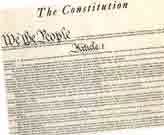|

 |
Editor’s Note: Not only is this a great history lesson, the author
points out our responsibilities as Citizens of the United States of
America. It is a CNO Must Read.
Heritage Foundation…
Political
Convention Drama Begins
By Julia Shaw and Amy Payne
August 27
This week's Republican National Convention is already experiencing its
own drama thanks to Tropical Storm Isaac, which has postponed most of
the events until tomorrow. But this year marks the 100th anniversary of
another Republican Convention embroiled in political drama of a
different nature.
Unlike today's conventions, which are little more than multi-day
campaign rallies, at the 1912 affair in Chicago, 1,000 policemen stood
by to make sure the delegates didn't get out of hand. Strands of barbed
wire lay concealed beneath the bunting on the speaker's platform to
keep disgruntled delegates from charging the stage.
The very nature of our Constitution and our democracy was at stake, as
William Schambra explains in a new First Principles essay from The
Heritage Foundation.
On one side was Teddy Roosevelt, who ran for President that year aiming
to reshape American democracy. He thrashed lackluster incumbent William
Howard Taft in the primary contests, declaring, "I believe in pure
democracy."
But his definition of "pure democracy" included upsetting the
Constitution. He endorsed "certain governmental devices which will make
the representatives of the people more easily and certainly responsible
to the people's will." These reforms included the initiative, the
referendum, the recall of elected officials and even judicial
decisions, and the direct election of U.S. Senators.
On the other side were Taft (Roosevelt's hand-picked successor in the
White House just four years earlier) and the Republican leadership,
including Senators Elihu Root of New York and Henry Cabot Lodge of
Massachusetts. They stood for the Constitution. Root and Lodge were
great admirers and longtime friends of Roosevelt, but Roosevelt had
sent shock waves through the Republican Party. Roosevelt had proposed a
dramatic constitutional change that, according to Schambra, "posed the
danger of undermining popular confidence in the institutions of
government." Therefore, Root, Lodge, and Taft were determined to deny
Roosevelt the nomination at the 1912 Republican convention.
Unlike the typically bland convention keynote speeches designed to
smooth feathers ruffled by the nominating contest and unite the party
for the main event in November, Root's keynote was a call to
constitutional conservatism.
As Schambra notes, Root grounded the Republican Party in the
Constitution, since it had been "born in protest against the extension
of a system of human slavery approved and maintained by majorities."
After all, the GOP was the party of Abraham Lincoln, who had declared
in his first inaugural address that "a majority held in restraint by
constitutional checks and limitations…is the only true sovereign of a
free people." The party's duty, therefore, was not to reform the
constitutional system but to "humbly and reverently seek for strength
and wisdom to abide by the principles of the Constitution against the
days of our temptation and weakness."
Preventing Roosevelt from winning the Republican nomination, these
first conservatives saved the party from a platform of radical
constitutional reform. But it also meant losing the general election.
Taft won only two states, and Democrat Woodrow Wilson became President,
with Roosevelt coming in second…
Read the rest of the article at the Heritage Foundation
Read the Declaration of Independence here
Read the Constitution of the United States of America here
Read the Bill of Rights here
|
|
|
|

